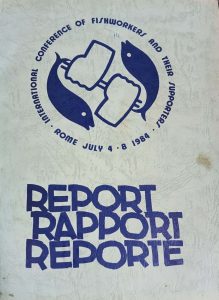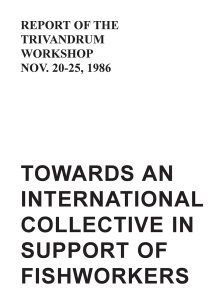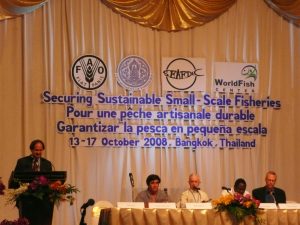A long and eventful journey lies behind the creation of the SSF Guidelines
This article is by John Kurien (kurien.john@gmail.com), Former Professor, Centre for Development Studies, Thiruvananthapuram, India and Honorary Member, ICSF
This is the story of the long and eventful journey towards the creation of the Voluntary Guidelines for Securing Sustainable Small-scale Fisheries in the Context of Food Security and Poverty Eradication (the SSF Guidelines). I have been a participant of this journey for five decades and this recollection represents my own perspective. Others may narrate it differently, but the essence remains the same: a story of small-scale fishers, deeply rooted in their socio-cultural heritage, reclaiming their rights to the sea and its resources. I divide this journey, spanning over a century, into eight distinct periods.
One (until 1950): Inklings
Since the earliest days, marine fisheries worldwide operated on a small-scale, artisanal basis. Modest boats, simple gear and a primary focus on self-consumption characterized this sector. Family involvement was vital in all aspects of production, yet the reins of control rested firmly in the hands of the merchant class that dictated terms for surplus sales and financial support.
Historical records show that as early as the 18th and 19th centuries, fishers faced the dual pressures of new industrial technologies and the dominance of merchants. Through newspapers, books and photographs, we learn of their early attempts at collective action to protect their livelihoods and economic independence. Governments and civil society began to intervene, enacting laws and fostering co-operative frameworks to protect fishers, and enacted measures like bans on trawlers. Many individual fishers—both men and women—were the heroes in these early struggles, although their names are lost to history.
Modest boats, simple gear and a primary focus on self-consumption characterized this sector
Two (1951-1970): Realization
After World War II, newly independent nations embarked on paths of economic development, with support from wealthier countries. This period, often termed the ‘Development Decades’, saw a focus on increasing production across various sectors, including fisheries. Developing nations, eager to adopt temperate-zone technologies, embraced innovations like bottom trawling, largely unaware of the repercussions for their own fishing communities.
The ban on shrimp exports from China in 1950 intensified the quest for alternative marine shrimp sources. Consequently, the rapid expansion of trawler fleets, predominantly owned by a new class of capitalists, engendered fierce competition with small-scale artisanal fishers for both sea space and resources.
One of the notable critics of this development paradigm was Professor Johan Galtung, a pioneer of peace studies and a staunch supporter of small-scale fishers. His opposition to the ‘blue revolution’ highlighted the adverse impacts of top-down development strategies on traditional fishing communities.
Three (1971-1980): Flashes of resistance
As developing countries imported foreign fishing technologies, they also imported the conflicts that came with them. Tensions flared between small-scale fishers and industrial fleets, leading to militant responses. Disillusionment spread as the promised benefits of fisheries development failed to materialize, with some governments responding in surprising ways—such as the military regime in Indonesia enacting the first ban on bottom trawling. Moreover, this period also witnessed the nascent re-emergence of conscientious reflection and reconsideration from academics, civil society activists and international organizations regarding the potential of small-scale fisheries (SSF).
In this period emerged key individuals and movements advocating for SSF. Figures who played pivotal roles, such as Matanhy Saldanha, who called for a national forum for Indian fishers, and Junko Yamaka, who organized the First Asian Fisher Conference. David Thompson’s “Thompson Table” also left a lasting impact on discussions about the advantages of SSF.
Four (1981-1986): Knowledge and advocacy

The disillusionment of the previous decade led to two key developments: efforts to build stronger data systems to demonstrate the merits of SSF, and collective action to advocate for fishworker rights at the national and international levels. The adoption of the UN Convention on the Law of the Sea (UNCLOS) in 1982 was a game-changer. It replaced the notion of ‘freedom of the seas’ with extended national jurisdictions. This shift empowered fishing communities to assert their rights to marine resources.
The adoption of the UN Convention on the Law of the Sea (UNCLOS) in 1982 was a game-changer
Two milestones of this period stand out: the 1984 Rome conference of fishworkers and the establishment, in 1986, of the International Collective in Support of Fishworkers (ICSF). Key figures of this period include Juan Crespin Torres, the trade union leader representing processing workers in the fishmeal industry of Peru, whose proposal for an international support group for fishworkers at the Rome conference left an indelible mark; Pierre Gillet and Jeremy Herklots, the innovative boat designers, whose participatory approach with small-scale fishers in creating designs for beach-landing boats, sparked a technological revolution in SSF in south India; and Francis Christy Jr, an FAO officer and author of the Territorial Use Rights in Fisheries (TURF) paper, whose extensive travels and insights into the dynamics of SSF in the tropics, validated the rationale of customary tenure and underscored the inadequacy and impracticality of Individual Transferable Quotas (ITQs) for these communities.
Five (1987-1994): International co-operation of movements

ICSF began serving as an anchor for the national and regional consolidation of fishworker movements that had begun to assert their presence in fisheries discourses. A fresh leadership emerged, bringing forth novel perspectives, including the imperative to mainstream the role of women from a feminist standpoint, and the recognition of fishers as the ‘beacons of the sea’, thereby underlining their pivotal role in fishery resource management, particularly at the local level.
On the global level, the ratification of UNCLOS and discussions surrounding the UN Fish Stocks Agreement marked a notable shift in international negotiations, with structured participation from small-scale fishworkers and fisheries support groups. This trend was welcomed as a new avenue for inclusive deliberations.
We fondly remember the visionaries of this period for their audacious spirit and unwavering commitment as champions of fishers’ rights. Among them are Humberto Chamorro, president of CONAPACH in Chile; Safronio Balagtas, president of Bikis Lakas in the Philippines; Joyachen Antony, president of the Kerala Swatantra Matsya Thozhilali Federation (KSMTF) in India; Victoria Mora, a fisher leader from Puntarenas in Costa Rica; Dao Gaye, President of the Collectif National des Pêcheurs Artisanaux du Sénégal (CNPS) in Senegal; Michael Bellevue, secretary of the Maritime Fishermen’s Union (MFU) in Canada; and Harekrishna Debnath of the National Fishworkers’ Forum (NFF) in India. We keenly feel their absence today.

Six (1995-2000): A global movement
This short but significant period marked the global consolidation of fishworker efforts, culminating in the formation of two global networks: the World Forum of Fish Harvesters & Fish Workers (WFF) and the World Forum of Fisher Peoples (WFFP). The adoption of the Code of Conduct for Responsible Fisheries (CCRF) in 1995 was a pivotal event, reinforcing the need for responsible practices in fisheries management. CCRF also underscored the integration of fisheries into coastal area management, recognizing the coast as the customary heritage of fishing communities. This implicit acknowledgement hinted importantly at the reciprocal nature of their tenure rights to both coastal land and sea.
The adoption of the UN Convention on the Law of the Sea (UNCLOS) in 1982 was a game-changer
Small-scale fishers continued to assert their rights in international negotiations, notably in the discussions on the UN Fish Stocks Agreement. FAO’s Advisory Council on Fisheries Research (ACFR) also shifted focus during this time, expanding its mandate to address the social and economic aspects of fisheries. The deliberations of the ACFR played a pivotal role in positioning the Committee on Fisheries (COFI) at the forefront of global advocacy efforts to highlight the manifold contributions of SSF.
Notable figures from this period include Thomas Kocherry, the passionate leader of NFF and WFFP, who advocated for a World Fisheries Day; Mohammed Ali Shah, leader of the Pakistan Fisherfolk Forum; Satya N. Nandan, the generous chair of the UN Fish Stocks Agreement negotiations, who enabled the participation of small-scale fishers; and Margarita Lizárraga, the influential FAO officer behind CCRF and FAO/ACFR revival, whose quiet but impactful support for fishworkers left a legacy.
Seven (2001-2007): A tragedy, transformation
The expansion of global fishworker networks continued during this period, with the International Planning Committee for Food Sovereignty (IPC) providing a platform for small-scale food producers. However, the devastating 2004 Indian Ocean tsunami brought the focus back to the human aspect of fisheries, highlighting the importance of traditional knowledge, youth involvement and local institutions.
The recognition of a human rights-based approach to SSF emerged during this time. Maizan Hassan Maniku, director of fisheries in the Maldives, played a pivotal role in fostering collaboration among fishworkers, civil society bodies and governments.
Eight (2008-2014): SSF Guidelines
The journey towards the SSF Guidelines culminated during this period. The 2008 Bangkok conference, supported by the government of Norway, was a landmark event that brought together diverse stakeholders from around the world to support SSF. In 2009, fishworker representatives from WFF, WFFP, IPC and ICSF called for a special policy instrument grounded in a human rights-based approach. In 2011, two national consultations were held in Cambodia and Malawi to outline an SSF framework tailored to respective national contexts.
WFF and WFFP, facilitated by ICSF with support from IPC and several local fisher groups and NGOs, conducted numerous meetings and workshops at national and regional levels during 2011-2012, engaging over 3,000 individuals from fishworker organizations and NGOs. These gatherings focused on articulating concerns and aspirations that had to be integrated into a global instrument with the consensus of all stakeholders. A co-ordinating committee of civil society organization synthesized these inputs into a structured draft.
These efforts culminated in the FAO zero draft of the SSF Guidelines and extensive negotiations, at times contentious, at technical consultations in 2013-2014. The Voluntary Guidelines for Securing Sustainable Small-scale Fisheries in the Context of Food Security and Poverty Eradication—we fondly call them the SSF Guidelines—were endorsed at the COFI Session 31 in July 2014.
In an unprecedented move for a UN document, the SSF Guidelines was dedicated to the efforts of one exceptional individual, deeply committed to small-scale fisheries: Chandrika Sharma, my former student and executive secretary of ICSF. She was aboard the ill-fated Malaysian Airlines flight MH 370, en route to an FAO regional meeting in Mongolia, to highlight the SSF Guidelines negotiation process.
And this brings me to the end of my short story of this long voyage.
For more
Rallying to Rome: Special People. Collective Processes. A Unique Event
https://www.icsf.net/wp-content/uploads/2024/06/930.ICSF251_ICSF-Rallying-to-Rome.pdf
Short story of a long voyage: Towards making of the FAO/UN small-scale fisheries guidelines
https://icsf.net/resources/kurien-john-2024-short-story-of-a-long-voyage-towards-making-of-the-FAO-un-small-scale-fisheries-guidelines/